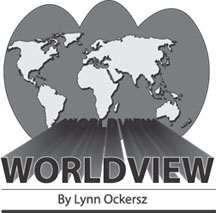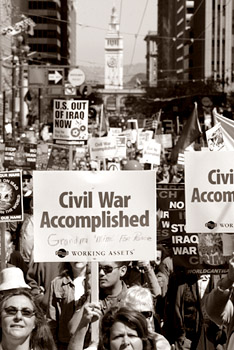The 'terror threat' in US foreign policy thinking
 With the US-led military intervention in Iraq entering its fifth year
and the anti-war sentiment in both the US and Great Britain booming amid
astronomical human costs of war in Iraq, the question that naturally
occurs is: for how long more will the Western powers hold out in
blood-drenched Iraq? With the US-led military intervention in Iraq entering its fifth year
and the anti-war sentiment in both the US and Great Britain booming amid
astronomical human costs of war in Iraq, the question that naturally
occurs is: for how long more will the Western powers hold out in
blood-drenched Iraq?
A most revealing reply comes from no less a person than US President
George Bush himself: "It can be tempting to look at the challenges in
Iraq and conclude our best option is to pack up and go home. That may be
satisfying in the short run, but I believe the consequences for American
security would be devastating."
The key phrase in the quote is: "Consequences for American security."
Now that the world's public could no longer be fooled with a "weapons of
mass destruction" bogey emanating from Iraq, the listener to this
observation from Bush is compelled to conclude that it is terror attacks
in the US and on American interests abroad which are being alluded to by
the US President through his reference to "American security."
In other words, the threat to US security emerging from South West
Asia based terror organisations should be substantially reduced before
the US considers effecting a troop withdrawal from Iraq.
|

UNITED STATES: Anti-war demonstrators march through downtown San
Francisco during a march and rally 18 March 2007 in San Francisco.
Thousands of protestors took to the streets to mark the fourth
anniversary of the US-led invasion of Iraq. AFP |
A most curious policy, considering the high human and political costs
of the US-led military involvement in Iraq. The eerily-rising American
and Iraqi casualty toll is the best proof at hand that the US-led
military involvement in Iraq has brought no apparent substantial
benefits for Iraq or the West.
If at all, it has only heightened the anti-war sentiment in the West
and brought increasing opposition in the West to the US-led military
involvement. In other words, the political costs are on the rise.
Still, Washington is showing little signs of a policy change in Iraq.
Apparently, there's much more than the world could "see" in this
conflict which Washington can "see". As far as policy parameters go,
apparently, there is much more than meets the public eye.
The security dimension in current US foreign policy is two-fold.
First, there is the economic security aspect of overall security
planning. Second, is the terror containment aspect which necessitates a
military response to terror threats to American interests both at home
and abroad, including the physical integrity of the US.
As has been often observed, the Gulf region is of tremendous
importance to US economic interests. After all, it is rich in oil wealth
and the US would prefer to perpetuate a military presence in the region,
lest a military threat emerges to the transportation of oil to the West.
Already, there is a considerable US naval presence in the Persian Gulf
region.
As important to Washington as the strategic raw material which is
oil, is the "terror threat." When discussing the latter phenomenon, one
cannot avoid focusing on the hard realities of world power politics.
Hegemonic control over the international political order is what a
predominant world power, such as the US, seeks. This was what the Cold
War in the immediate post World War II decades, was all about with the
US-led NATO and the Soviet Union-led Warsaw Pact striving with each
other for global military, economic and political control.
This time round, the central actors in global politics have changed
but the substance remains the same. The US remains a hegemonic power and
would always act as one. In furthering the latter task, the "terror
threat" would prove immensely useful.
The "terror threat" cannot be dismissed as yet another figment of the
imagination but the US would prefer to keep it alive.
For, it helps in uniting the world behind the US. Washington has
succeeded a great deal in Asia in achieving this. Many are the Asiatic
States which are cooperating with the US in the "war against terror." It
would like to do this in other parts of the world too, and the "terror
threat" would facilitate this effort at influencing-wielding.
This is the reason why Washington would not be in too great a haste
to effect a troop withdrawal from Iraq. For, it is the US military
presence in Iraq and Afghanistan which keeps alive the "terror threat."
It is also the reason why the Democrats in Congress are now seen as
being rather slow-footed on the US troop withdrawal issue. When it comes
to the essentials of US foreign policy, the Republicans and the
Democrats could not be expected to differ too vastly.
[email protected]
|
